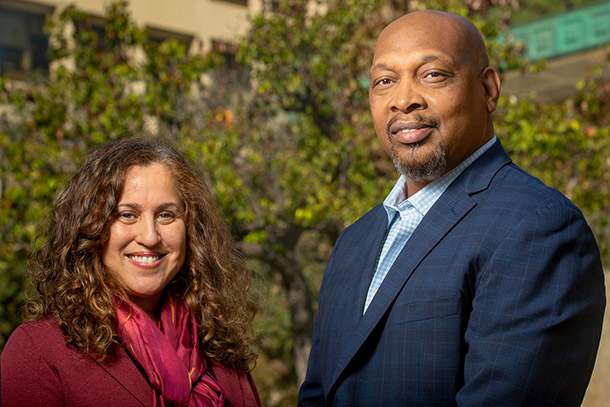The National Cancer Institute has awarded a five-year, $16 million grant to create a cancer health equity center at USC and two partner institutions that will conduct research on cancer health disparities, train underrepresented minorities and perform community outreach.
USC will collaborate with the University of Florida and Florida Agricultural and Mechanical University, a historically black college. Leading the USC component are John Carpten, PhD, professor and chair of translational genomics, and Mariana Stern, PhD, professor of research preventive medicine and urology at the Keck School of Medicine of USC.
“We are thrilled about this new grant and center under Carpten’s and Stern’s leadership. It is a rare opportunity to bring together world-class science and community engagement in a way that will also develop the next generation of scientists who come from the communities we serve,” said Laura Mosqueda, MD, dean of the Keck School. “We are so proud that Keck’s researchers, students and staff will be leading the way nationally toward advancing cancer health equity.”
USC will initially focus on the genomics and biological underpinnings of prostate and pancreatic cancer, which have high mortality in African-Americans and Latinos, to better understand the biology driving higher incidence and death rates. Researchers will create a repository of biological specimens from African-American and Latino patients to help with this and future studies.
Another research project, led by the University of Florida, will aim to reduce differences in chemotherapy treatment by using the molecular profiles of patients to predict their sensitivity to certain drugs. One of Florida A&M’s contributions will be its ethnically diverse faculty and focus on health disparities research, Carpten said. University of Florida and Florida A&M have worked closely together addressing this issue for the past four years.
“When you have minorities doing research to serve communities to which they belong, it moves faster,” Stern said. “Studies show that when you don’t have enough minority scientists engaged in research, you introduce more disparities.”
Cancer disparities among minorities
The cancer health differences among whites, and African-Americans or Latinos are particularly stark. For example, for all cancers combined, the death rate is 25 percent higher for African-Americans than for whites, according to the National Cancer Institute. Latinos have the highest rates for cancers associated with infection, such as liver, stomach and cervical cancers.
“I’m proud that we will be helping lead the way nationally toward advancing cancer health equity,” Carpten said. “I am very committed to understanding why certain diseases and disorders exact heavier burdens on underrepresented populations.”
An important aspect of the bicoastal center is the chance to look at the genetics of cancer health disparities across its highly diverse communities in Florida and Southern California, Carpten said. These include American-born, African-born and Caribbean-born blacks, and Mexican-Americans, Caribbean Latinos, and Central and South Americans.
The center, called CaRE2, is short for the Florida-California Cancer Research, Education and Engagement Health Equity Center.
“USC’s Norris Comprehensive Cancer Center rests within a region that is rich in diversity and we are dedicated to providing quality and equitable care to all patients within our catchment area,” said Peggy Farnham, PhD, interim director of the USC Norris Comprehensive Cancer Center. “The CaRE2 center is primed to help us accomplish our goals through basic translational research, education and community engagement, specifically in the area of cancer health disparities.”
A key goal of the initiative is to diversify the research workforce focused on cancer and health disparities. The new center aims to train 125 young scientists, ranging from those who’ve just completed bachelor’s degrees, graduate students, postdoctoral students and early career scientists.
“There will be a knowledge exchange,” Stern said. “Everything we do will come back to the community; we’re training health workers on both coasts.”
The grant comes from a federal program started in 2001 to pair minority-serving institutions with NCI-designated Cancer Centers, such as the USC Norris Comprehensive Cancer Center.
In addition to Stern and Carpten, founding members of the CaRE2 center at USC include Lourdes Baezconde-Garbanati, Wendy Setiawan and Wendy Cozen of the Department of Preventive Medicine; Enrique Velazquez-Villareal and David Craig of the Department of Translational Genomics; Ite Laird-Offringa and Bo Han of the Department of Surgery; Joyce Richey of the Department of Physiology and Biophysics; and Pinchas Cohen, dean of the USC Leonard Davis School of Gerontology.
— Leigh Hopper


